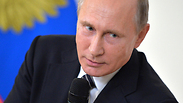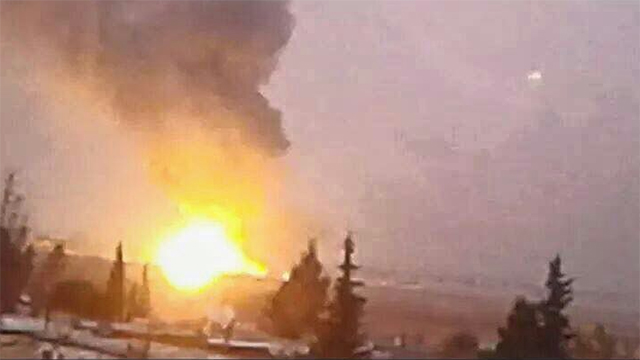
Israeli-Russian understandings put to the test
Analysis: Wednesday’s attack on a Syrian army outpost and Hezbollah arms convoy is seen as a ‘case study’ for the alleged limits of Israel’s freedom of action in Syria and Lebanon.
So far, the Russians have settled for quoting the Syrian army spokesman’s statement on the alleged Israel Air Force attack in the Damascus area. There have been no condemnations, no commentaries, no leaks from sources in Russia’s top echelon. The fact that Moscow is sticking to the Syrian version suggests that as far as the Russians are concerned, they accept the fact that Israel is responsible for the attack and have no intention of participating in the Israeli hide and seek. Nevertheless, the fact that they have not issued their own statement suggests that they have yet to decide what to do with this information.
In informal conversations with sources associated with the Russian defense establishment, they ask: What are you expecting actually? A direct public Russian response? If we say that Israel coordinated the attack with us, we will have to provide explanations to our allies in Hezbollah; and if we say you did not coordinate it with us, we will have a problem explaining how Israel operates on Syrian soil without informing us.
The Russian response is critical, as the attack attributed to Israel is, allegedly, a first public test of the understandings reached between the political leaderships, on the Putin and Netanyahu level. Since deploying their army in Syria in 2015, there have been fewer reports of IAF strikes in Syria, apart from along the border in the Golan Heights. While reality called for a continuation of these actions, as Hezbollah – with the help of the Syrian army – kept smuggling military equipment to Lebanon, it seemed that Israel had chosen not to put the understandings with Russia to the test.
Israel and Russia have no cooperation agreement in Syria. The Russians do not report their aerial activity to the IDF, and Israel – as far as we know – is not supposed to report its aerial activity to them. But there is an understanding that each party knows where the other party’s interests lie and makes every effort not to interfere with them. So the Russians fly in certain areas, and the IAF flies in different areas. The aerial radar image is transparent to both parties.
About a year ago, foreign sources reported that Russian planes had been launched towards IAF planes flying somewhere in the Mediterranean. Such incidents are solved on the leadership level, the deputy chief of staff vis-à-vis his Russian counterpart, and the Israeli and Russian liaison units which engage in a dialogue on either side’s flight deviations. If a Russian officer detects an Israeli plane which possibly approaching a Russian interest, he will likely submit an inquiry to his Israeli counterpart.
The advanced antiaircraft missiles, the S-400 and the S-300, which the Russians installed in order to protect the seaport in Tartus and the Hamimim Airport in Syria, should not pose a threat to the IAF, apart from situations of misunderstandings, which could occur at any given moment. That is likely why the IAF is now flying in the area in a more conservative manner than before. It’s reasonable to assume that every activity across the border is examined in Israel much more carefully in order to expand the security margins.
Nevertheless, Israel has clarified all along that it will not give up on a single red line it has set for itself in Syrian and in Lebanon: No chemical weapons in the hands of the Syrian army or Hezbollah, no violation of the Israeli sovereignty and no smuggling of equipment which Israel considers a taboo to Lebanon. The Russians did not intervene when Israel struck in the Golan Heights after its sovereignty was violated.
The third red line has been violated more than once in the past year, according to foreign reports, and therefore – according to those reports – Israel on Wednesday attacked a clear target which also allows it to test the limits of its understandings with the Russians. The Russian response so far may create the impression that Russia acknowledges Israel’s right to prevent the spillover of a certain kind of weapon from Syrian to Lebanon. Whether this situation will continue for long is uncertain.











